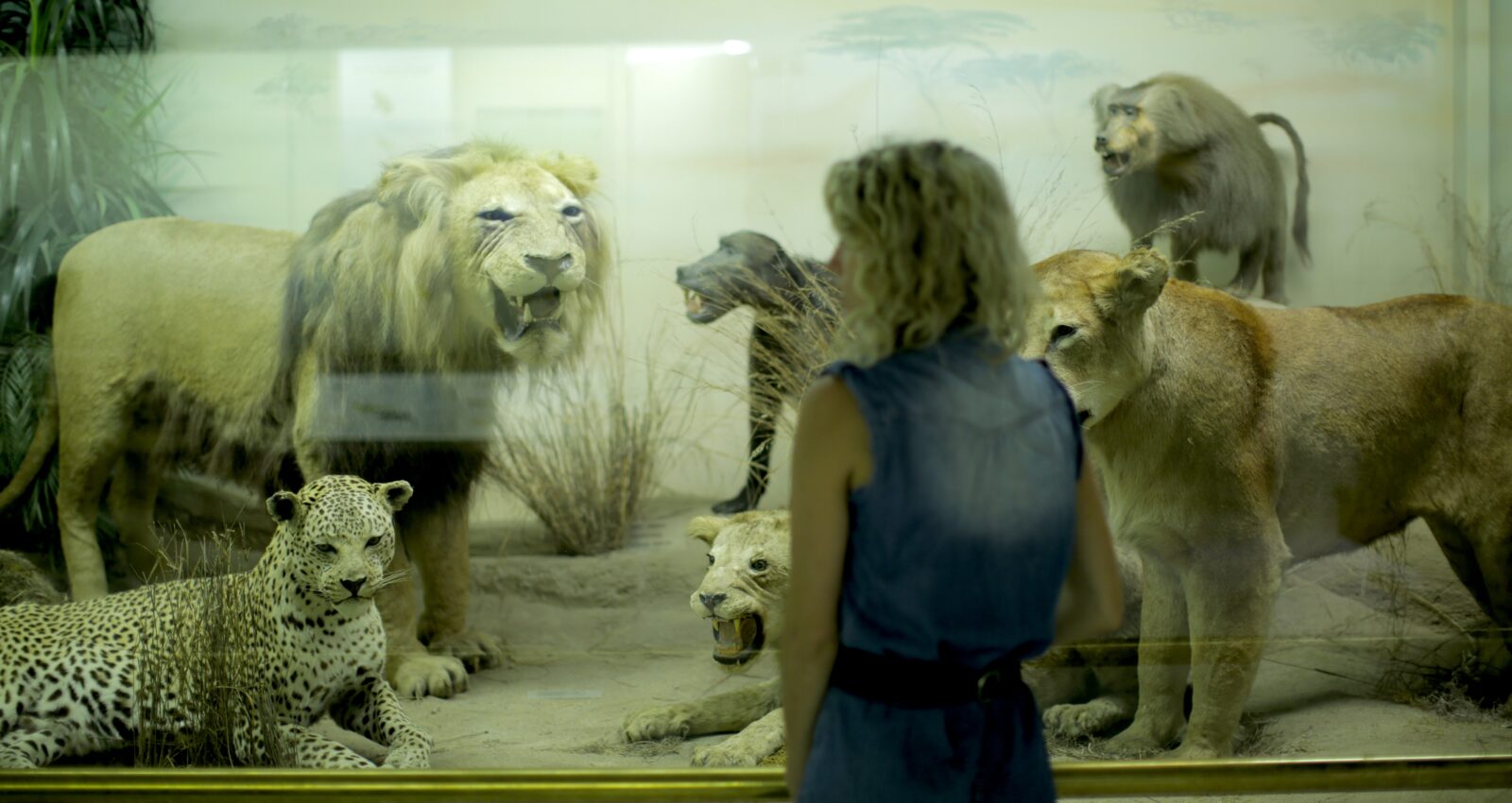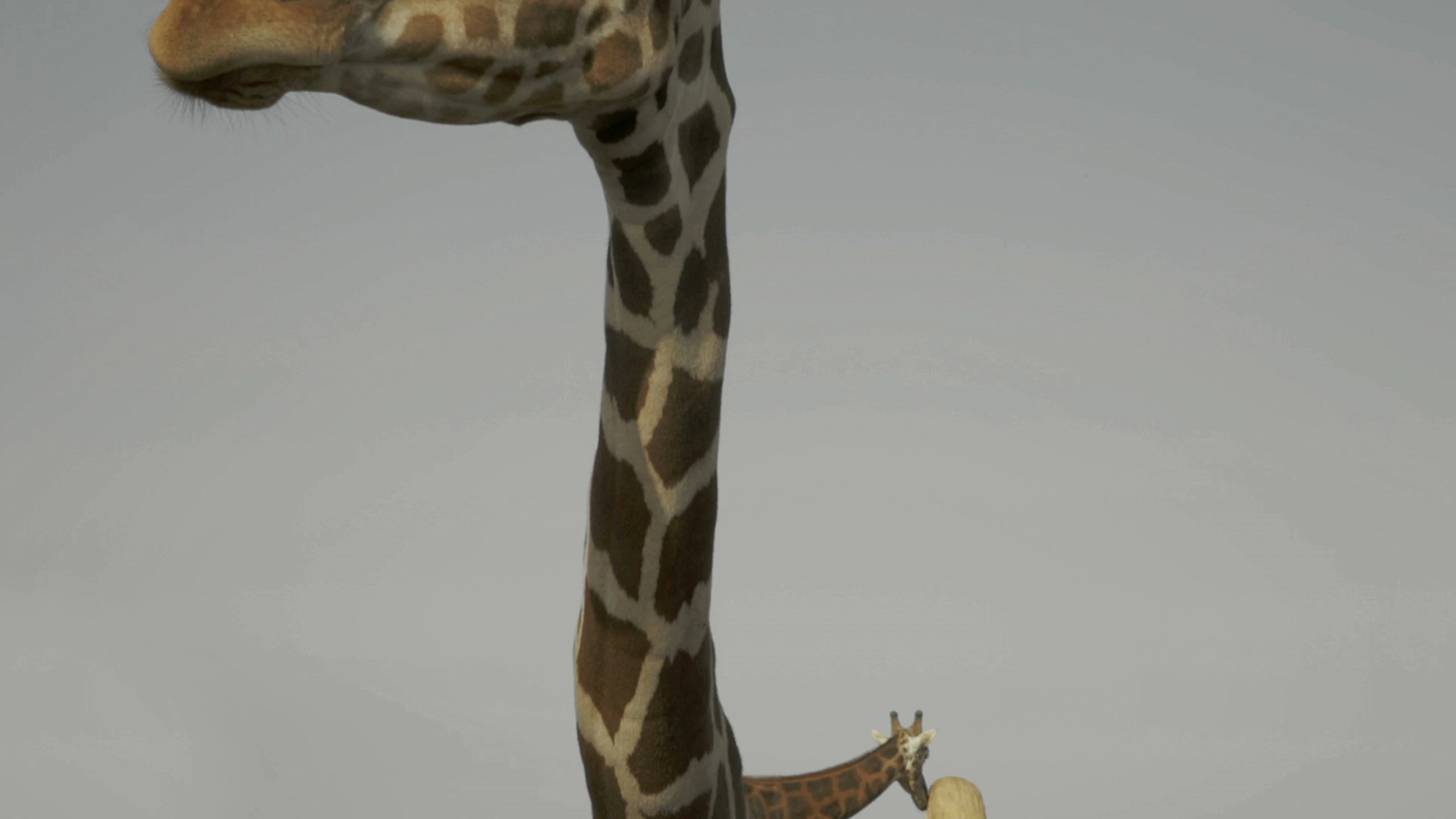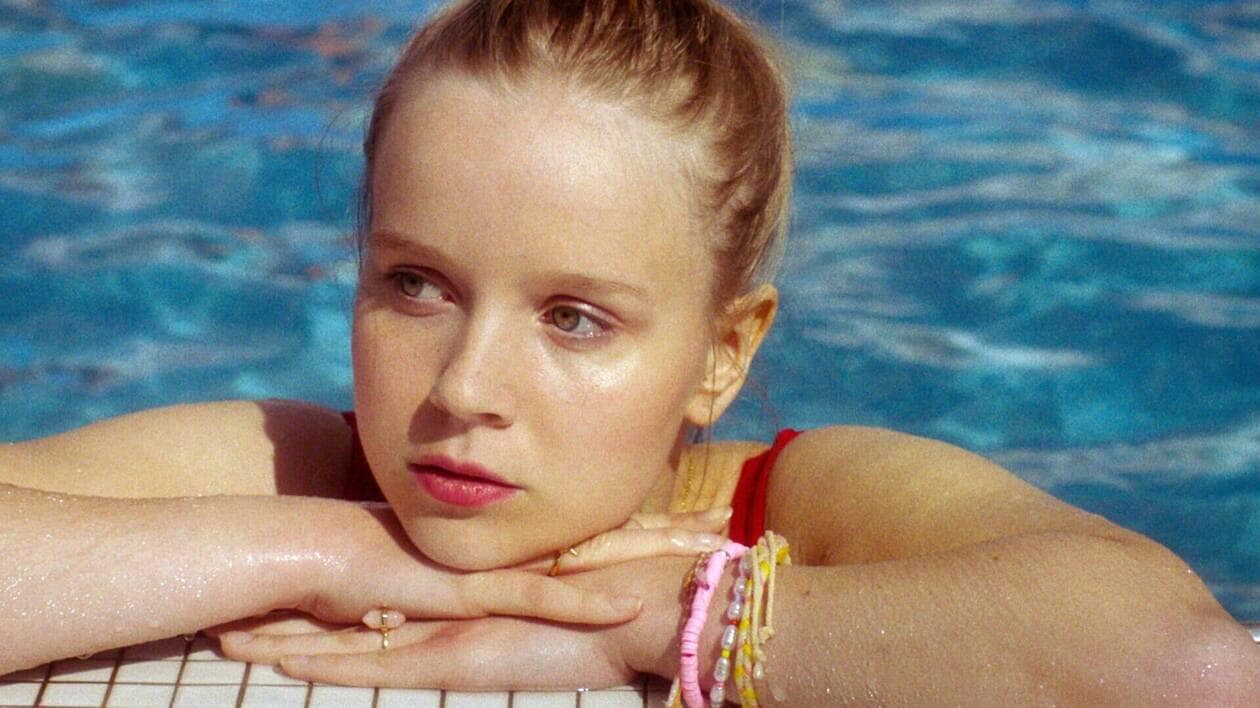It’s a Wild World
A Talk with Konstanina Kotzamani
Drawing from dreams, Greek filmmaker Konstanina Kotzamani builds a whole new world in each film, often populated with animals.

Cinema is a spectacle—in its long- or short form—as long as the film world conjured feels expansive and dense to a spectator perambulating metaphorical paths. This fanciful analogy is certainly true for Greek-born director Konstantina Kotzamani, whose short films have enchanted festival audiences and earned multiple awards for over a decade, their dreamy urban landscapes often populated with animals.
Oneiric is a word that describes not only the aesthetic of Koztamani’s films whose narratives are sparse and yet convoluted, driven by a logic of their own, just like dreams. In fact, the director trusts her nighttime visions enough to draw ideas for her films out of subconscious images. Her first short film, Pigs, for example, was inspired by a recurring dream she had as a child “where the three little pigs [of the Grimm fairytale] became my family, vulnerably exposed to the [big] bad wolf.” It was her first project in the Film Department of Fine Arts of Thessaloniki, made “with no emotional censorship or practical restraints” with close friends and collaborators. “I really enjoyed the intimacy of the process. It felt more like a ritual we all jumped in—like a psych journey for the whole team,” she adds.
Kotzamani admits she actively keeps a dream diary and sees it as a source to draw from, be it images, links between them, keys to decoding traumas, or to understand herself better. “I feel that Dreams are full of beautiful unexplained visions, visual misunderstandings that you have to unlock or decrypt, to solve the psychic riddle of your life,” she reveals. It is the dream-logic of her films that attracts descriptors like “surrealistic”, as the basis of that movement in early 20th-century art was also the unconscious, ripe with manifestations of desire and anxieties. Trust is key for the filmmaking Kotzamani is interested in: trusting the process, the irrational streak that led to it all, and, as a result, gaining the viewer’s confidence with the openness of her work. “When I think of my early work,” the director shares looking back at Pigs, “I relate to it more through emotional memory, the people around it, the initial channels that lead me there, the journey I had to follow… and less with the final product.”

Washingtonia (Konstantina Kotzamani, 2014)
Washingtonia, Kotzamani’s 2014 short, opens with a close-up of a giraffe’s face in profile. Slowly, the animal tilts its head to meet the camera’s gaze while a voice off-screen declares (in French) that the giraffe has the biggest heart of all animals. So big, in fact, that its pulses can be felt by the other animals in and through the ground. Such a statement sets the off-kilter tone for a film about giraffes, palm trees, loss, and decay. In Washingtonia, Athens is said to be a country with a tropical climate—which it isn’t—but one can shudder at the thought of all those perilous forest fires that plagued Greece in 2024 almost as a premonition.
The film takes its title after the Washingtonia robusta, known by its common name as the Mexican fan palm, and there is, indeed, a palm tree to look at. It’s a sick tree, a red beetle gnawing at its heart. Its owner, Madame Elli, speaks to the perishing palm and confesses it is dying with her. That idea of dying alongside one another—humans, animals, and plants are very much equal in these worlds—summarises the specific kind of kinship and togetherness that binds Kotzamani’s shorts. “Cities and trees look alike, their time of death is never accurate,” says the narrator in Yellow Fieber (2015), where Athens is described as a city located on the Equator—which it isn’t—and we see wide shots of empty streets with a palm tree center-frame; a pink cloudy sunrise marks the place in the sky where the sun is fighting to make itself known, with clouds bleeding from the punch marks left in the Athenian skyline.
When discussing the mood of her films, Kotzamani underscores that every stage of the filmmaking process is important, from writing to post-production. As a writer-director penning her scripts, she describes the writing process as “collecting the spiritual energy that will drape over the film, designing the invisible tableaux of ideas, images, feelings.” To her, pre-production is the stage where everything is still possible and, in her words, “intangible.” Shooting on location, then, brings these ideas “down to earth,” and the director admits she spends a lot of time scouting places “in order to recreate the magic puzzle of images that I already have in my mind.” Aside from Athens and Chios island, locations like Buenos Aires in Argentina have proven to be equally special for the Greek-born director. In Electric Swan, which premiered in 2019 at the Venice Film Festival, Carlos is a janitor and concierge in an upper-class highrise that moves. Yes, in Kotzamani’s films, palm trees die and buildings move. In those narrative conceits lies a socio-political critique of class, capitalism, and pollution.
As a result, the world we see in each of her shorts is sleek, digitally shot, and framed in stylised wide shots and central compositions. But there is a trembling under the surface, every building, tree, and human throbbing with inner life. Washed-out colours of green and desaturated yellows can deceive us only so much: it feels like everything on screen is moist and pungent. In short, the Greek director builds a whole world anew each time. Yet, these ‘surreal’ aesthetics don’t cut off the connection with what we would call ‘reality’. When asked, Kotzamani describes her attitude towards fiction as “searching for gates to open and doors to unlock.” In a similar vein, she speaks of the “invisible net of collective unconscious and a universal tank of imagination and knowledge that puts a spell on the characters and influences their actions,” alluding to a logic that’s both otherworldly and deeply existential. These protagonists, young or old, are always searching for themselves, driven by a higher force of desire they have yet to decipher.

What Mary Didn’t Know (Konstantina Kotzamani, 2024)
Kotzamani’s latest film is the mid-length What Mary Didn’t Know, which premiered last year in Locarno. In it, Mary, a Swedish teenage girl, is bored out of her mind while on a cruise ship holiday with her parents and brother. That is, until she meets someone special with whom she doesn’t share a language. A love story on a boat called “Neoromantica” where passengers sip on Marriage Margaritas combines the allure of Greek myth and the anticipation of Arabian Nights in the director’s own brand of politically conscious fairytale realism. Mary epitomises that Kotzamani character who’s driven by dream-logic and draped with layers of magic and eventually gets to fulfill what the director calls “a karmic puzzle.” This puzzle analogy directly correlates to the way Kotzamani’s world-building works: pieces of a whole that find their way by moving around, almost like mapping a path for the first time with your own footsteps. When I mention mapping, she agrees. “I like to build these psycho-onerical maps that rule the character’s world like astrological maps do,” she says, “by giving answers in possibilities and creating realities layered over other realities.”
On casting actress Tora Sandström as Mary, Kotzamani admits that she had already seen over 200 casting tapes of Swedish girls, when she engaged Sandström in a sort of mythological roleplay. “I asked her to play the heroine of various fairy tales and myths, from Sleeping Beauty to Leda in Greek mythology,” she explains. Kotzamani imagines the look of a character while writing the script, comparing the process to the work of AI: “[your mind] creates new images of people and places by combining materials from a reservoir of emotional and aesthetic memory. These images, while vague at first, quickly become very specific, like a transformer taking shape before the battle. Imagining a hair colour, skin texture, or a twinkle in the eye, a meteoric frown without which the character is no longer the same.”
A combination of captivating particularities—like a character’s habit of buying the same cake every day—and weird assertions that fold their truth into falsehoods—like Athens’ contested topography and climate—makes Kotzamani’s films a hybrid that’s both familiar and surprising. Their crisp visuals, long, static takes, and rather unreliable voiceover narration never feel alienating; on the contrary, their mysteries are always inviting. The director, who’s been working on her debut feature, Titanic Ocean, while we corresponded, describes her two latest works as “fables and myths merged with real life, with the blurred boundaries between the natural and supernatural with characters on the fringes of society.” Konstantina Kotzamani’s work uses fabulation (or fabrication, if you prefer) to recreate the world as we know it, but not at the cost of its peril. For a filmmaker who approaches our doomed world with deep compassion and surprisingly little melancholy, conjuring “a world of enigmas and unspoken tensions” doesn’t necessarily mean escaping the one we already have.

